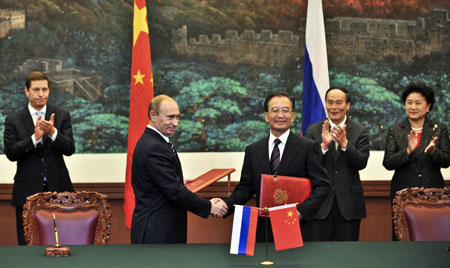As China and Russia strengthen ties, Indo-Sino ties seem to become more fragile, now feebler than at any other time in last decade. India has amplified its rhetoric against China, and Beijing has been frank in expressing concern over India’s planned Agni-V ballistic missile test. From Arunachal Pradesh to Azad Kashmir, there have been several key instances last week in which Indian foreign policymakers seem to have been unnerved, even alleging China is constructing a dam on the Brahmaputra.

Indians argue that that it will take at least three years before Agni-V becomes operational, since it will require four or five more tests, series production, and user-trials by the armed forces. Indians also claim that the 5,000-km strike range of Agni-V is trifling when compared to China’s DongFeng 31A missile, which can hit targets 11,200 km away. An unnamed official source quoted in Indian newspapers state: “China’s missile and nuclear arsenal is leagues ahead of India, capable as it is of hitting any city in India. We can never compete. Our entire focus is on building only credible minimum deterrence against China, not active offensive capabilities.”
I agree—India can never compete with China, and I don’t understand the logic of building “deterrence” when by its own admission India recognizes it is not in the same league as China. Of course there is always more than meets the eye. Agni-V will be mobile and can be moved closer to the Chinese border on short notice, bringing even China’s northern-most city, Habin, within the missile’s strike envelope.
India is also developing Multiple Independently targetable Re-entry Vehicles (MIRV) warheads for the Agni missiles. An MIRV payload is basically several nuclear warheads carried on a single missile, which can be programmed to hit different targets, independent of each other. In effect, this means that even ballistic missile defense systems can be overwhelmed by MIRVs.
Indians claim this is aligned with their nuclear doctrine, which says, “Nuclear retaliation to a first strike will be massive and designed to inflict unacceptable damage.”
The gravity of this doctrine can be accurately understood when you look at other news items in Indo-Sino relations last week.
Indians have been making a commotion about the Brahmaputra dam and China’s alleged involvement in Azad Kashmir. In November 2006 India and China agreed to establish an Expert Level Mechanism to discuss trans-border river issues in an institutional way. Three meetings have been held so far. The Chinese maintain that there are no plans to build any large scale diversion projects on the Brahmaputra River.
But Indians can’t seem to trust this statement or any other promises from China. Reports from New Delhi claim that the Indian government will “ascertain whether there are recent developments that suggest any change in the position conveyed to us by the government of China.”
When Indian premier Manmohan Singh met Chinese president Hu Jintao on the sidelines of the ASEM summit in Beijing, the two men devoted most of their time discussing the Brahmaputra.
And as if clashes over Agni-V and the Brahmaputra were not enough, Indians have been clamoring about Arunachal Pradesh and Azad Kashmir. India has been critical of China’s development activities in Azad Kashmir, and Indian external affairs ministry spokesman Vishnu Prakash was quoted saying, “We hope that the Chinese side will take a long term view of the India-China relations, and cease such activities in areas illegally occupied by Pakistan.”
During a meeting with Pakistan Prime Minister Yusuf Raza Gilani last week, the Chinese president outlined a major project to upgrade the Karakoram highway, which connects the two countries overland, and coordinated Chinese help in the Neelam-Jhelum hydroelectric project in Kashmir. “Howsoever, the international situation may change. The people of China and Pakistan are always joined in hearts and hands,” Hu said at that time.
India’s Ministry of External Affairs (MEA) also claimed that the State of Arunachal Pradesh is an integral and inalienable part of India. The statement was issued by a Ministry spokesman shortly after China expressed “strong” dissatisfaction over Prime Minister Manmohan Singh’s recent visit to Arunachal Pradesh for electioneering.
I can’t keep myself from wondering: Why is India so angst-ridden?
Surely, it cannot be because China has expressed solidarity with Pakistan; after all, Pak-Sino relations reach back through six decades of trust. What is rather interesting—and must also be disconcerting to India— is Russia’s emergent ties with China. It was not long ago that India ditched Russia to draw nearer to the U.S. Until that point, ‘Hindu- Rossi bhai bhai’ was the most popular slogan in India. But things have changed. Both Chinese and Russian media have given extensive coverage to Prime Minister Vladimir Putin’s visit to China on October 12-14, speaking highly of the trip and expressing optimism over the prospects of Russian-Chinese ties.
Last week China and Russia signed 12 agreements, whose total monetary value exceeds $4 billion. The premiers of each country convened to hold their fourteenth regular meeting in Beijing, which included a framework agreement on Russia’s export of natural gas to China, a memorandum of understanding (MOU) on high-speed trains, and an agreement on mutual notification of ballistic missiles and launch of carrier rockets.
The burgeoning dynamics between China-Russia and China-Pakistan are unraveling India, and the New Delhi foreign ministry appears to be in a tail spin.









